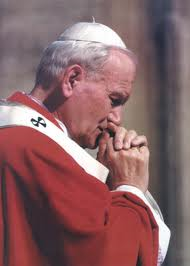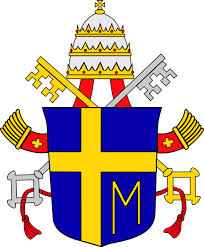|
ST. JOHN PAUL II'S COMMENTS ON NAJU
1.
The
Holy Father sent his private secretary: Mgsr. Vincent Thu to Naju
in September 1995 and sent the following message for Julia Kim: “I have a profound respect for the Blessed
Mother of Naju and a sincere consolation for Mrs. Julia Kim.” 2.
To
the Korean Bishops during their ad
limina visit to the Holy See in 1996: 3.
To Bishop William McNaughton from the
Inchon Diocese in Korea during the ad
limina visit in March 2001:
“I
also saw the change in the Eucharist in Julia’ mouth.” 4.
To
the Korean Bishops during the same ad
limina visit in March 2001:
“How
is the current situation in Naju?”
(The Holy Father was asking the Bishops if they had carried
out his request in 1996.) 5.
To
Bishop Paul Kim from the Cheju Diocese in Korea who presented a
detailed report on Naju to the Holy Father for one hour during the
same ad limina visit in March 2001: The Holy Father expressed a strong
joy and satisfaction and said to Bishop Kim, “I will send instructions to officials.”
Soon the information about Naju was propagated in Italy and
other countries with the approval of the Holy See.
A REFLECTION “You are built upon the foundation of the apostles
and prophets with Christ Jesus himself as the chief corner stone.
In him the whole structure is closely fitted together and
grows into a temple holy in the Lord; in him you too are being built
together into a dwelling place for God in the Spirit” —St. Paul
(Ephesians 2:20-22). “So that she (the Church) can fulfill her mission,
the Holy Spirit ‘bestows upon [the Church] varied hierarchic and
charismatic gifts, and in this way directs her’” (Lumen
gentium 4). “What
the soul is to the human body, the Holy Spirit is to the Body of
Christ, which is the Church.”— St. Augustine (En.) The Holy Spirit
is “the principle of every vital and truly saving action in each
part of the Body” — (Pius XII,
Mystici Corporis, DS 3808). The Twelve Apostles and their successors (the Bishops) are
the foundation on which Our Lord built his Church. The Bishops and
priests (their assistants) protect the purity of the truths and
commandments and teach them to the faithful. The Holy Spirit
involves Himself in that process to enable the shepherds to teach
the faithful without errors and help the sheep (the faithful) to
accept correctly and put into practice what they learn in their
daily lives. The Holy Spirit is constantly and essentially at work on
both sides: the shepherds and the faithful.
Without the Holy Spirit’s enlightening, warnings, and
encouraging, it will be impossible for us to lead a correct spiritual
life that will lead us to salvation and eternal life.
If anyone becomes a member of the Church, but does not pray and
puts aside the promptings and energization by the Holy Spirit from his
process of making decisions and choices but follows his own will and
volition only, he is not really practicing the life as a child of God,
a disciple of Jesus, or a faithful member of the Church. — Benedict Lee, Mary's Touch By Mail, 4.27.2014. |
[ Home ] [ Messages and Signs ] [
In Defense of the Truth
] [ Saints ] [ Testimonies ] [ Ordering ]

